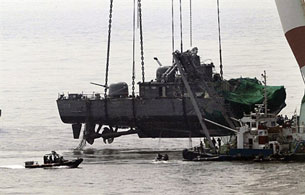South Korea: Cheonan fallout hits defectors
| Publisher | Radio Free Asia |
| Publication Date | 11 June 2010 |
| Cite as | Radio Free Asia, South Korea: Cheonan fallout hits defectors, 11 June 2010, available at: https://www.refworld.org/docid/4c2b5e292.html [accessed 1 June 2023] |
| Disclaimer | This is not a UNHCR publication. UNHCR is not responsible for, nor does it necessarily endorse, its content. Any views expressed are solely those of the author or publisher and do not necessarily reflect those of UNHCR, the United Nations or its Member States. |
2010-06-11
North Korea's youngest defectors feel shunned by peers amid rising inter-Korean tensions.
 A floating crane lifts the stern of the South Korean warship Cheonan out of the ocean, April 15, 2010. AFP
A floating crane lifts the stern of the South Korean warship Cheonan out of the ocean, April 15, 2010. AFP
SEOUL – Younger defectors in South Korea say they feel increased pressure amid the fallout from the deadly sinking of a South Korean ship by North Korea in late March.
As soon as investigations confirmed the North's involvement, young North Korean defectors, who are all now citizens of South Korea, said they were subjected to constant questioning by classmates over the incident.
"Before, when I introduced myself to a stranger, saying that I was from North Korea, people would just think 'Wow, he came from a tough place,'" one young defector told a round-table discussion between defectors and South Korean students sparked by the sinking incident.
"However, now, when I introduce myself as someone born in North Korea, people can't avoid thinking of the Cheonan," he added.
"I think I sense this prejudice. I sense that people feel that 'these North Koreans are dangerous,' so, since the Cheonan incident, I have no longer said I am from North Korea."
Other students agreed, saying that while they hadn't been on the receiving end of obviously unfriendly treatment, "we often feel hurt by the questions they ask."
'We feel hurt'
According to defectors, two of such most frequently asked questions include, "Why do you think the North Korean regime attacked the Cheonan?" and "Do you think North Korea will start a war in the future?"
A second North Korean student commented: "We know that our South Korean friends do not necessarily ask these questions maliciously. Nevertheless, we feel hurt, and there isn't much we can do about it."
Children and young adults who defect to South Korea from the Stalinist North already face a long battle in adapting to life – and education – in a capitalist country.
After receiving a North Korean-style education, which focuses on the 'supreme goodness' of the regime and stifles creative thinking, they often spend years in hiding, often in China, missing out on several years' education as their South Korean peers are flocking to cramming schools to improve their grades.
The second defector student called on South Koreans to think more carefully before asking North Korean defectors about the Cheonan, the sinking of which has ratcheted up tensions on the Korean peninsula to a high pitch in recent weeks.
"We are citizens of the Republic of Korea [South Korea], too.... You can ask us all you want, but what do we know? We no longer live in North Korea," he said.
Agents arrested
The Cheonan's sinking on March 26 was followed April 20 by the arrest of two North Korean agents accused of plotting to assassinate Hwang Jang Yeop, the highest-ranking North Korean ever to defect, a former Secretary of the ruling Workers' Party and Chairman of the Supreme People's Assembly.
The reports fueled suspicions in South Korea that some of the 20,000 North Korean defectors currently living in the South could be sleeper agents, dispatched by the North Korean regime.
During the discussion forum, the defector students reminded their South Korean peers that "the sinking of the Cheonan was not an act perpetrated by the ordinary people of North Korea, but by the Kim Jong Il regime."
A South Korean student said that it is common for students in South Korea to pretend to ignore the existence of North Korean defectors in their midst.
"From the moment North Korean defectors set foot on South Korean soil, they became citizens of the Republic of Korea," he said.
"They used to live in North Korea but they are now citizens of the Republic of Korea, and I don't understand why they should feel guilty for actions conducted by North Korea."
Another said he finds it regrettable that North Korean defectors in the South are hurt and offended by attitudes toward them.
"I sometimes wonder whether North Korean defectors may be offended and left with emotional scars because of such talk," he told the May 21 round-table event in South Korea's Kangwon province.
Original reporting in Korean by Songwu Park. Korean service director: Myungsoo Kwak. Translated from the Korean by Grigore Scarlatoiu. Written in English by Luisetta Mudie. Edited by Sarah Jackson-Han.
Link to original story on RFA website
